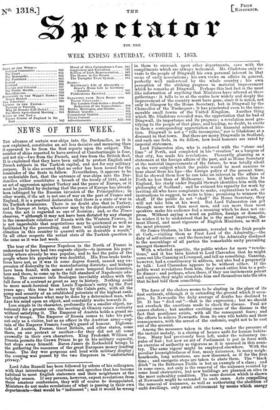Lord John Russell has been followed by others of his
colleagues, with that interchange of courtesies and speeches that has become habitual to most English statesmen and their neighbours at the holyday season. If any persons, however, expect revelations from these amateur conferences, they will of course be disappointed. Ministers do not make revelations of what is passing in their own departments—that would be " indisoreet "; and it would be wrong
in them to encroach upon other departments, save with the compliments which are always welcomed. Mr. Gladstone only re- veals to the people of Dingwall his own personal interest in that scene of early associations ; his own views on affairs in general, perfectly well understood by the whole country ; his own perception of the striking progress in material improvement which he remarks at Dingwall. Perhaps this last fact is the most like information of anything that Ministers have uttered at these gatherings : it tells to us at the centre how widely and deeply the improvement of the country must have gone, since it is noted, not only in Glasgow by the Home Secretary, but in Dingwall by the Chancellor of the Exchequer ; it has penetrated even to the innu- merable small towns of the United Kingdom. Another thing which Mr. Gladstone revealed was, the appretiation that he had of Dingwall, its importance and its progress ; a revelation most gra- tifying to the people of that place, and tending, no doubt, to excite in them a corresponding appretiation of his financial administra- tion. Dingwall is not a " vile ineomprise," nor is Gladstone at a discount in that town. But there are many Dingwalls in Scotland, and each one feels, in its fellow, how local honours are rated by imperial statesmen.
Lord Palmerston also, who is endowed with the "stone and lime" of Perth, and completed in his "creation" as a burgess of that city, has made his revelations. Pleasantly glancing as a statesman at the foreign affairs of the past, and as Home Secretary at the material improvements of the future, he was totally silent on the very subject which the public would be most anxious to hear about from his lips—the foreign policy of the present time. But he showed thorn how he can take an interest in the affairs of Perth no less than of Melbourne ; how, if birth unites him to England, his study under Dugald Stewart identifies him with the philosophy of Scotland ; and he evinced his rapacity for work by inviting all who have complaints to make, explanations to ask, or instructions to suggest, to write to him ; promising to winnow the chaff. If the public do not " chaff " the Home Secretary, they will not take him at his word. But Lord Palmerston can get through more work than most men, and can more than most speakers make his audience feel a meaning which he does not ex- press. Without saying a word on politics, foreign or domestic, he wishes it to be understood that he is the most improving, the most liberal, and most vigorous of English Ministers, as well as the most pleasant. Sir James Graham, in like manner, revealed to the Irish people at Cork,—visiting them as First Lord of the Admiralty,—the duty of self-reliance ; awl the Secretary of the Admiralty disclosed to the assemblage of all parties the remarkable unity prevailing amongst themselves. With a whetted appetite, the public wishes for more "revela- tions," and it has been hinted to Lord Clarendon that he might come out like Canning at Liverpool, and tell us something. Canning, however, had a constituency to address, and also had a propensity to talk : Lord Clarendon appears to be without either. If the public want revelations from him, they must entice him to a pub- lic dinner ; and perhaps, when there, if they use incitements potent and copious, they might stimulate him and themselves into the idea that he had told them something.


























